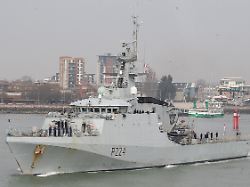Caracas speaks of provocation
Britain sends warship to Guyana
December 25, 2023, 7:02 a.m
The Essequibo region of Guyana has large oil reserves. This arouses desire in neighboring Venezuela. Although both states have agreed to refrain from violence, the conflict is increasingly escalating. And now the former colonial power Great Britain is getting involved.
Amid the border dispute between Venezuela and Guyana over the oil-rich Essequibo region, Great Britain has announced the dispatch of a warship – and thereby aroused the anger of the government in Caracas. The British Ministry of Defense said HMS Trent would visit “regional ally and Commonwealth partner Guyana” in December. It is part of a patrol mission by the warship in the Atlantic.
According to media reports, the “HMS Trent” is currently in Barbados and will then head to the coast of the former British colony of Guyana. According to the British broadcaster BBC, maneuvers with other countries are planned. The warship, which is normally stationed in the Mediterranean, was sent to the Caribbean at the beginning of December to combat drug smuggling.
Venezuela’s Defense Minister Vladimir Padrino López described the ship’s deployment to Guyana as a “provocation.” Such provocations would endanger “the peace and stability” of the region, the minister wrote on had agreed to threats of violence.
More oil than in Kuwait
Tensions had previously increased over the Essequibo area in Guyana, which has been claimed by Venezuela for more than a century. At the beginning of December, participants in a non-binding referendum in Venezuela voted by a large majority in favor of the South American country’s claim to Essequibo, according to government information. Shortly afterwards, Maduro called for the area to be declared a Venezuelan province by law and for oil production licenses to be issued.
Around 125,000 of the 800,000 residents of the former British and Dutch colony of Guyana live in Essequibo. Caracas’ desires increased after the oil company ExxonMobil discovered an oil deposit in the area in 2015. In October, another significant oil discovery was made in the region, increasing Guyana’s reserves to more than those of oil-rich Kuwait or the United Arab Emirates.
In mid-December, Presidents Maduro and Ali agreed to refrain from violence at a meeting in the island state of St. Vincent and the Grenadines. But that doesn’t change the fact that Venezuela continues to claim the area.
